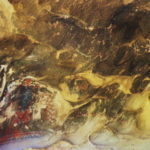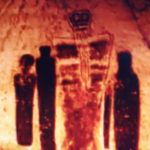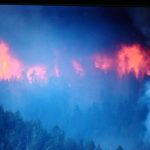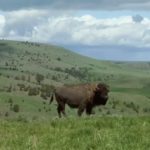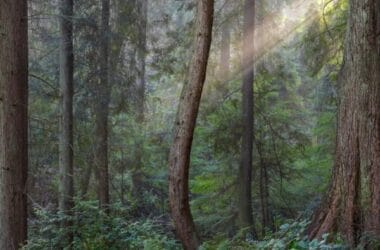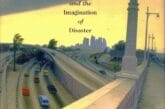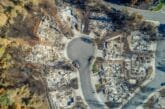A myth from the Warao People who inhabit the rainforests of the Orinoco Delta of northeastern Venezuela and western Guyana. The term Warao means “The Boat People,” referring to their intimate connection with water. Here a hunter takes on an ogress in a story of the origin of the Pleiades.
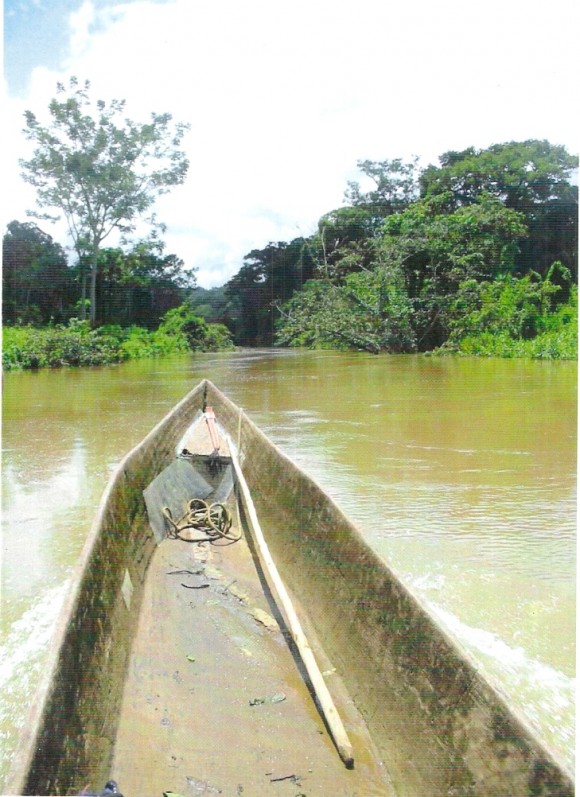

“The Origin of the Stars,” A Myth from the Warao People
Once upon a time there were two brothers, the elder of whom was a celebrated hunter. Each day he searched farther into the forest for game, finally reaching a creek never seen before. He climbed a tree standing at its edge to watch for animals that came to drink. Suddenly he saw a woman behaving strange, wading through the water toward him. Each time she put her hand into the creek she produced two fish, and each time eating one and throwing the other into her basket.
She was a very big woman, a supernatural being. On her head she wore a calabash, and occasionally took it off, spinning it away on the water like a top.
The Giant Woman Wearing a Calabash
The hunter spent the night in a tree and returned to the village the next day. He told the story to his younger brother, who begged to go along to see “such a woman that could catch so many fish and eat them as well.” “No,” was the reply, “because you always laugh at everything, and you might laugh at her.” But the young man promised to keep a straight face, persuading his elder brother.
When they reached the stream, the elder brother climbed into his tree, which stood just back from the edge. The younger one insisted on positioning in a better-placed tree, so as to miss nothing, sitting on a branch overhanging the water. The woman soon arrived, behaving as before.
She then waded directly beneath the young brother’s tree and noticed the reflection of his shadow in the water. She tried to catch hold of it, failing, grasping, tripping about, splashing. With queer gesticulations and ridiculous slapping of the shadow, the brother above could not resist laughing at her vain attempts. He did not stop laughing.
Hunter, Attacked By Poisonous Ants
Thereupon, the woman spied the two brothers. Furious at having been laughed at, she launched an attack with poisonous ants (Eciton species); they bit and stung the boy so badly that, to escape he had to jump in the water. There the woman caught him and ate him.
Afterward, she captured the older brother and secured him in a basket. On returning to her hut, she put the basket down and forbade her two daughters to touch it.
As soon as her back was turned, her daughters lost no time in opening it. They were delighted with the hunter’s physical appearance and his talents as a hunter. Both of them, indeed, fell in love with him, and the younger one hid him in her hammock.
When the time came for the ogress to kill and eat her prisoner, the daughters confessed to their misdeeds. Their mother agreed to spare her unexpected son-in-law, on condition that he go fishing on her behalf. But however big the catch he brought back, the ogress would devour it all, apart from two fish. Eventually, so worn out the hero soon fell ill.
The younger daughter, who was by now his wife, agreed to run away with him. One day he told his mother-in-law he had left his catch in his canoe and she should fetch it. (A fisherman was not supposed to carry the fish himself, since this would spoil his luck.) However, he had arranged for an alligator to wait under the canoe, which devoured the ogress.
Ogress, Devoured By an Alligator
The elder daughter discovered the murder, sharpened her knife, and pursued the culprit. When she was about to catch up with him, he directed his wife to climb a tree, and followed after her. Yet he was not quick enough to prevent his sister-in-law from cutting off one of his legs. The detached member sprang to life and became the mother of birds (Tinamus species). You can still see, in the night sky, the hero’s wife (the Pleiades). Lower down, the hero himself (the Hyades) and, lower still, is his severed leg–Orion’s belt.


The Warao People inhabit the rainforests of the Orinoco Delta of northeastern Venezuela and western Guyana. The term Warao means “The Boat People,” referring to their intimate connection with water. The above myth was first published by British anthropologist Sir Walter Roth (1861-1933), cataloged in The Raw and the Cooked, Mythologiques Volume 1, By Claude Levi-Strauss, The University of Chicago Press, and edited here by Jack Eidt.
Updated 20 February 2021



